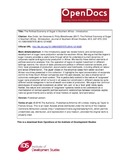The Political Economy of Sugar in Southern Africa – Introduction
| dc.contributor.author | Dubb, Alex | |
| dc.contributor.author | Scoones, Ian | |
| dc.contributor.author | Woodhouse, Philip | |
| dc.coverage.spatial | Southern Africa | en |
| dc.date.accessioned | 2017-06-22T14:16:04Z | |
| dc.date.available | 2017-06-22T14:16:04Z | |
| dc.date.issued | 2016-09-16 | |
| dc.identifier.citation | Alex Dubb, Ian Scoones & Philip Woodhouse (2017) The Political Economy of Sugar in Southern Africa – Introduction, Journal of Southern African Studies, 43:3, 447-470, DOI: 10.1080/03057070.2016.1214020 | en |
| dc.identifier.issn | 1465-3893 | |
| dc.identifier.uri | https://opendocs.ids.ac.uk/opendocs/handle/20.500.12413/13016 | |
| dc.description.abstract | In this introductory paper we review historic and contemporary development of sugar cane production across the southern Africa. We argue that the region’s sugar industry provides a useful lens through which to understand current dynamics of corporate capital and agricultural production in Africa. We identify three distinct elements of political-economic analysis: first, the operation of logics of capital investment in different settings; second, the nature of state policies and politics in different national contexts; and third, local processes of production, accumulation and livelihoods, including effects on labour and social differentiation. The paper draws on the empirical cases from seven southern African countries presented in this collection. It highlights the rapid concentration of corporate control by three South African companies over the past decade, but also a diverse set of outcomes contingent on local context. This is particularly evident in the nature of ‘outgrower’ sugar cane production which is found in all cases but constituted in different places by quite different social categories in terms of wealth and scale of production. We argue that common stereotypes of corporate investment as either ‘win–win’ or as a ‘land grab’ rarely apply. Rather, the nature and outcomes of ‘outgrower’ systems needs to be understood as a manifestation of context-specific political-economic relationships between corporate capital, national governments and a variety of local holders of capital, land and labour. | en |
| dc.language.iso | en | en |
| dc.publisher | Journal of Southern African Studies | en |
| dc.rights | This is an Open Access article distributed under the terms of the Creative Commons Attribution License (http:// creativecommons.org/licenses/by/4.0/), which permits unrestricted use, distribution, and reproduction in any medium, provided the original work is properly cited. | en |
| dc.rights.uri | http://creativecommons.org/licenses/by/4.0/ | en |
| dc.subject | Agriculture | en |
| dc.title | The Political Economy of Sugar in Southern Africa – Introduction | en |
| dc.type | Article | en |
| dc.rights.holder | © 2016 The Author(s) | en |
| dc.identifier.externaluri | http://dx.doi.org/10.1080/03057070.2016.1214020 | en |
| dc.identifier.doi | 10.1080/03057070.2016.1214020 | |
| dcterms.dateAccepted | 2016-09-16 | |
| rioxxterms.funder | Default funder | en |
| rioxxterms.identifier.project | Default project | en |
| rioxxterms.version | VoR | en |
| rioxxterms.versionofrecord | 10.1080/03057070.2016.1214020 | en |
| rioxxterms.funder.project | c941507f-fd0b-4fc3-9822-4b2132f61a1d | en |
Files in this item
This item appears in the following Collection(s)
-
IDS Research [1661]
Except where otherwise noted, this item's license is described as This is an Open Access article distributed under the terms of the Creative Commons Attribution License (http://
creativecommons.org/licenses/by/4.0/), which permits unrestricted use, distribution, and reproduction in any medium,
provided the original work is properly cited.


